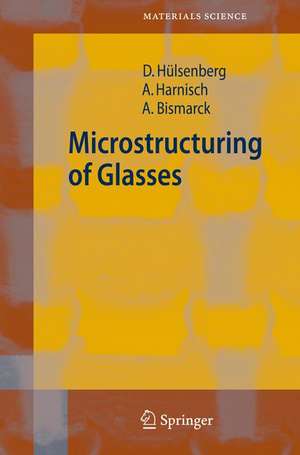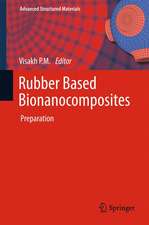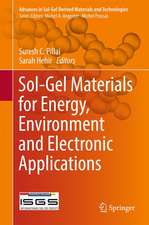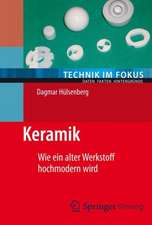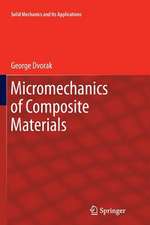Microstructuring of Glasses: Springer Series in Materials Science, cartea 87
Autor Dagmar Hülsenberg, Alf Harnisch, Alexander Bismarcken Limba Engleză Hardback – 24 apr 2008
| Toate formatele și edițiile | Preț | Express |
|---|---|---|
| Paperback (1) | 959.04 lei 43-57 zile | |
| Springer Berlin, Heidelberg – 30 noi 2010 | 959.04 lei 43-57 zile | |
| Hardback (1) | 953.03 lei 43-57 zile | |
| Springer Berlin, Heidelberg – 24 apr 2008 | 953.03 lei 43-57 zile |
Din seria Springer Series in Materials Science
- 18%
 Preț: 1820.22 lei
Preț: 1820.22 lei - 18%
 Preț: 776.09 lei
Preț: 776.09 lei - 24%
 Preț: 689.68 lei
Preț: 689.68 lei - 18%
 Preț: 968.96 lei
Preț: 968.96 lei - 20%
 Preț: 568.94 lei
Preț: 568.94 lei - 18%
 Preț: 953.65 lei
Preț: 953.65 lei - 18%
 Preț: 902.36 lei
Preț: 902.36 lei - 18%
 Preț: 953.65 lei
Preț: 953.65 lei - 20%
 Preț: 948.41 lei
Preț: 948.41 lei - 18%
 Preț: 1143.07 lei
Preț: 1143.07 lei - 18%
 Preț: 1111.53 lei
Preț: 1111.53 lei - 18%
 Preț: 1103.62 lei
Preț: 1103.62 lei - 18%
 Preț: 1225.94 lei
Preț: 1225.94 lei -
 Preț: 473.91 lei
Preț: 473.91 lei - 18%
 Preț: 782.42 lei
Preț: 782.42 lei -
 Preț: 433.47 lei
Preț: 433.47 lei - 18%
 Preț: 1116.40 lei
Preț: 1116.40 lei - 18%
 Preț: 946.24 lei
Preț: 946.24 lei - 18%
 Preț: 945.20 lei
Preț: 945.20 lei - 15%
 Preț: 641.20 lei
Preț: 641.20 lei - 18%
 Preț: 958.56 lei
Preț: 958.56 lei - 18%
 Preț: 1224.36 lei
Preț: 1224.36 lei - 15%
 Preț: 644.82 lei
Preț: 644.82 lei - 24%
 Preț: 833.43 lei
Preț: 833.43 lei - 24%
 Preț: 1060.33 lei
Preț: 1060.33 lei - 18%
 Preț: 964.10 lei
Preț: 964.10 lei - 18%
 Preț: 1224.36 lei
Preț: 1224.36 lei - 18%
 Preț: 1221.20 lei
Preț: 1221.20 lei - 18%
 Preț: 946.87 lei
Preț: 946.87 lei - 18%
 Preț: 1842.31 lei
Preț: 1842.31 lei - 15%
 Preț: 643.34 lei
Preț: 643.34 lei - 18%
 Preț: 1246.32 lei
Preț: 1246.32 lei - 18%
 Preț: 956.81 lei
Preț: 956.81 lei - 18%
 Preț: 953.52 lei
Preț: 953.52 lei - 15%
 Preț: 637.59 lei
Preț: 637.59 lei - 24%
 Preț: 1060.87 lei
Preț: 1060.87 lei
Preț: 953.03 lei
Preț vechi: 1162.23 lei
-18% Nou
Puncte Express: 1430
Preț estimativ în valută:
182.36€ • 190.88$ • 151.78£
182.36€ • 190.88$ • 151.78£
Carte tipărită la comandă
Livrare economică 31 martie-14 aprilie
Preluare comenzi: 021 569.72.76
Specificații
ISBN-13: 9783540262459
ISBN-10: 3540262458
Pagini: 348
Ilustrații: XX, 326 p.
Dimensiuni: 155 x 235 x 23 mm
Greutate: 0.66 kg
Ediția:2008
Editura: Springer Berlin, Heidelberg
Colecția Springer
Seria Springer Series in Materials Science
Locul publicării:Berlin, Heidelberg, Germany
ISBN-10: 3540262458
Pagini: 348
Ilustrații: XX, 326 p.
Dimensiuni: 155 x 235 x 23 mm
Greutate: 0.66 kg
Ediția:2008
Editura: Springer Berlin, Heidelberg
Colecția Springer
Seria Springer Series in Materials Science
Locul publicării:Berlin, Heidelberg, Germany
Public țintă
ResearchCuprins
Fundamentals of Inorganic Nonmetallic Glasses and Glass Processing.- Silicate Glasses: A Class of Amorphous Materials.- Thermodynamic Phenomena in Glass.- Melting and Forming Glass Half Products for Microstructuring.- Geometrical Microstructuring of Glasses and Applications.- to Geometrical Microstructuring.- Mechanical Structuring Processes.- Chemical and Complex Structuring Processes.- Thermal and Thermomechanical Structuring Processes.- Microstructuring Glasses Using Lasers.- Geometrical Photostructuring.- Joining Methods for Glass Based Microdevices.- Properties and Selected Applications of Microstructured Glass Devices.
Textul de pe ultima copertă
As microstructured glass becomes increasingly important for microsystems technology, the main application fields include micro-fluidic systems, micro-analysis systems, sensors, micro-actuators and implants. And, because glass has quite distinct properties from silicon, PMMA and metals, applications exist where only glass devices meet the requirements. The main advantages of glass derive from its amorphous nature, the precondition for its - theoretically - direction-independent geometric structurability. Microstructuring of Glasses deals with the amorphous state, various glass compositions and their properties, the interactions between glasses and the electromagnetic waves used to modify it. Also treated in detail are methods for influencing the geometrical microstructure of glasses by mechanical, chemical, thermal, optical, and electrical treatment, and the methods and equipment required to produce actual microdevices.
Caracteristici
First book on structuring glass for micro- and nanophotonic applications Includes supplementary material: sn.pub/extras
